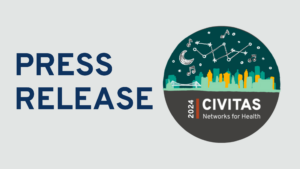By: Jolie Ritzo, VP of Strategy and Network Engagement, Civitas Networks for Health
Community-led collaboratives are emerging as powerful catalysts for change in health care transformation. One such pioneering effort is taking shape in Oregon, where a unique approach to the Health Data Utility (HDU) model is underway. Collaborators from the initiative shared their experience at the Civitas Networks for Health 2023 Annual Conference. Their “Community-Led HDU Concept in Oregon” session provided deep insights into the importance of community-led governance, a commitment to working equitably, and the willingness to invite diverse perspectives to the table.
The Oregon HDU Model: A Community-Centric Approach
Rather than starting top-down the Oregon HDU approach is trialing building from the ground up. They are cultivating relationships and trust, building carefully, and working up to gain state recognition. The HDU’s foundation is built on the strong collaboration of various entities, including a Regional Health Improvement Collaborative (RHIC), Community-Based Organizations (CBOs), an HIE, an All-Payer Claims Database (APCD), and Federally Qualified Health Centers (FQHCs).
The session featured two Civitas members and one of their key partners, Meredith Roberts of Comagine Health, Erick Maddox of Reliance eHealth Collaborative , and Carly Hood-Ronick of Project Access NOW. Throughout their presentation, they highlighted Oregon’s statewide focus on addressing the health-related social needs of its diverse population. This approach underscores the significance of understanding and catering to the unique needs of local communities to best serve the population at hand.
A New Era of Data Sharing and Collaboration for Oregon
Oregon’s HDU initiative is in its early stages, with outcomes still on the horizon. However, the path forward is marked by a strong emphasis on governance, data aggregation – encompassing claims, clinical, social, and public program data – and data quality. This comprehensive data approach is a cornerstone of the HDU model, ensuring a more holistic view of patients’ health needs through longitudinal enhanced records. This offers providers inside and outside the walls of health care an opportunity to provide more responsive and coordinated care.
Key Learnings from the Session: Community-Led HDU Concept in Oregon
A few key learnings from this session were:
- Partnerships Need to Be at the Core: The initiative is grounded in a collaborative spirit, bringing together various stakeholders so that a greater pool of perspectives is included at the outset and through partnership a greater set of services is provided to meet expanded use cases.
- Community-Driven Decisions are Critical: The community collective, not the state or other entities, is the primary decision-maker in this model. This approach prioritizes equitable representation and focuses on the community’s needs and voice.
- Relationships Over Technology: While technological platforms are essential, this initiative focuses on fair representation and equitable health care delivery rather than being tied to any specific tech platform.
- Governance and Inclusion: Efforts are underway to establish a governance structure that includes HIEs, CIEs, APCDs, CBOs, the state, FQHCs, and public health. The key lesson learned is the need for more CBOs and FQHCs at the decision-making table, ensuring a more inclusive and representative approach.
Looking Ahead: The Road to Equitable Health Data Sharing
The Oregon community-led HDU concept represents a significant shift in how health data is collected, shared, and used. It’s an explorative model that prioritizes community needs and voices, ensuring that data-sharing initiatives lead to meaningful and equitable health outcomes. As this initiative continues to evolve, it sets a precedent for other regions to follow, encouraging a more inclusive and community-focused approach to health data utilization.
For more information about HDU visit Civitas’ HDU page, and we encourage you to visit Comagine Health, Project Access NOW, and Reliance eHealth Collaborative’s websites for greater detail about the Oregon partners.


